Fantasy comedy or comic fantasy is a subgenre of fantasy that is primarily humorous in intent and tone. Typically set in imaginary worlds, fantasy comedy often involves puns on, and parodies of, other works of fantasy.

Lyon Sprague de Camp was an American author of science fiction, fantasy and non-fiction literature. In a career spanning 60 years, he wrote over 100 books, including novels and works of non-fiction, including biographies of other fantasy authors. He was a major figure in science fiction in the 1930s and 1940s.

Fantasy literature is literature set in an imaginary universe, often but not always without any locations, events, or people from the real world. Magic, the supernatural and magical creatures are common in many of these imaginary worlds. Fantasy literature may be directed at both children and adults.

The Castle of Iron is the title of a fantasy novella by American authors L. Sprague de Camp and Fletcher Pratt, and of the novel into which it was later expanded by the same authors. It was the third story in their Harold Shea series. As a 35,000-word novella it was first published in the fantasy magazine Unknown for April, 1941. The revised and expanded novel version was first published in hardcover by Gnome Press in 1950, and in paperback by Pyramid Books in 1962. The book has been reprinted by a number of other publishers since its first appearance. An e-book edition was published by Gollancz's SF Gateway imprint on September 29, 2011 as part of a general release of de Camp's works in electronic form. The novel has been combined with other books in the series in the omnibus editions The Compleat Enchanter (1975), The Complete Compleat Enchanter (1989) and The Mathematics of Magic: The Enchanter Stories of L. Sprague de Camp and Fletcher Pratt (2007). It has also been translated into Italian.

Terri Windling is an American editor, artist, essayist, and the author of books for both children and adults. She has won nine World Fantasy Awards, the Mythopoeic Fantasy Award, and the Bram Stoker Award, and her collection The Armless Maiden appeared on the short-list for the James Tiptree, Jr. Award.

Elements of the supernatural and the fantastic were an element of literature from its beginning. The modern genre is distinguished from tales and folklore which contain fantastic elements, first by the acknowledged fictitious nature of the work, and second by the naming of an author. Works in which the marvels were not necessarily believed, or only half-believed, such as the European romances of chivalry and the tales of the Arabian Nights, slowly evolved into works with such traits. Authors like George MacDonald (1824–1905) created the first explicitly fantastic works.

Lud-in-the-Mist (1926) is the third and final novel by the British writer Hope Mirrlees. It continues the author's exploration of the themes of Life and Art, by a method already described in the preface of her first novel, Madeleine: One of Love's Jansenists (1919): "to turn from time to time upon the action the fantastic limelight of eternity, with a sudden effect of unreality and the hint of a world within a world".
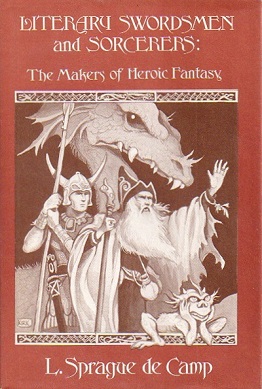
Literary Swordsmen and Sorcerers: The Makers of Heroic Fantasy is a work of collective biography on the formative authors of the heroic fantasy genre by L. Sprague de Camp (1907–2000), first published in 1976 by Arkham House in an edition of 5,431 copies. Nine chapters (2–10) are revisions from a series of ten articles, also titled "Literary Swordsmen and Sorcerers," that initially appeared in the magazine Fantastic and the fanzine Amra between 1971 and 1976. A French edition was issued in May 2010 under the title Les pionniers de la fantasy, and an ebook edition was issued in June 2014 by Gateway/Orion.

The Undesired Princess is a 51,000 word fantasy novella by American writer L. Sprague de Camp. It was first published in the fantasy magazine Unknown Worlds for February 1942. It was published in book form by Fantasy Publishing Company, Inc. in 1951. The book version also includes the 10,000 word fantasy short story "Mr. Arson", first published in Unknown for December 1941. The book was bound together with Stanley G. Weinbaum's The Dark Other in the omnibus collection Fantasy Twin by the same publisher in 1953. The title story was also published in paperback by Baen Books in 1990 together with David Drake's story The Enchanted Bunny, under the combined title The Undesired Princess & the Enchanted Bunny.
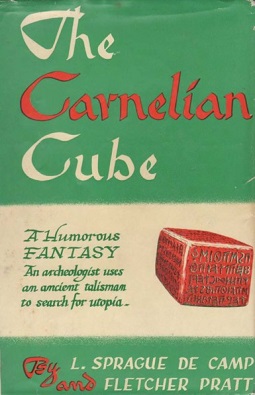
The Carnelian Cube is a science-fantasy novel by American writers L. Sprague de Camp and Fletcher Pratt. It was first published in hardcover by Gnome Press in 1948, and in paperback by Lancer Books in 1967. An E-book edition was published by Gollancz's SF Gateway imprint on September 29, 2011 as part of a general release of de Camp's works in electronic form. It has also been translated into Italian and German.
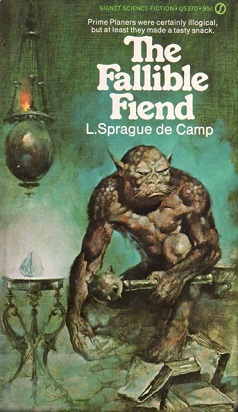
The Fallible Fiend is a fantasy novel by American writer L. Sprague de Camp, the third book of his Novarian series. It was first published as a two-part serial in the magazine Fantastic for December 1972 and February 1973, and subsequently expanded and revised for book publication. The novel was first published in book form as a paperback by Signet Books in 1973; it was later reprinted by Remploy (1974), Sphere (1978), Del Rey/Ballantine (1981), Baen (1992) and the Thorndike Press (2002). The Remploy edition was both the first British and first hardcover edition. An e-book edition was published by Gollancz's SF Gateway imprint on September 29, 2011 as part of a general release of de Camp's works in electronic form. It has also been translated into German and Italian.

Rogue Queen is a science fiction novel by American writer L. Sprague de Camp, the third book in his Viagens Interplanetarias series. It was first published in hardcover by Doubleday in 1951, and in paperback by Dell Books in 1952. A later hardcover edition was issued by The Easton Press in its The Masterpieces of Science Fiction series in 1996; later paperback editions were issued by Ace Books (1965) and Signet Books. A trade paperback edition was issued by Bluejay Books in June 1985. The first British edition was published in paperback by Pinnacle Books in 1954; a British hardcover reprint followed from Remploy in 1974. The novel has been translated into Portuguese, Italian, French and German. An E-book edition was published by Gollancz's SF Gateway imprint on September 29, 2011 as part of a general release of de Camp's works in electronic form.
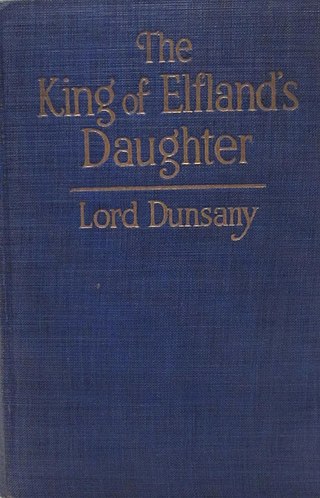
The King of Elfland's Daughter is a 1924 fantasy novel by Anglo-Irish writer Lord Dunsany. It is widely recognized as one of the most influential and acclaimed works in all of fantasy literature. Although the novel faded into relative obscurity following its initial release, it found new longevity and wider critical acclaim when a paperback edition was released in 1969 as the second volume of the Ballantine Adult Fantasy series.

The Broken Sword is a fantasy novel by American writer Poul Anderson, originally published on 5 November 1954. It was issued in a revised edition by Ballantine Books as the twenty-fourth volume of their Ballantine Adult Fantasy series in January 1971. The original text was returned to print by Gollancz in 2002. The novel is set during the Viking Age and the story contains many references to the Norse mythology.

Great Short Novels of Adult Fantasy I is an anthology of fantasy novellas, edited by American writer Lin Carter. It was first published in paperback by Ballantine Books in September, 1972 as the fifty-second volume of its Ballantine Adult Fantasy series. It was the eighth such anthology assembled by Carter for the series.
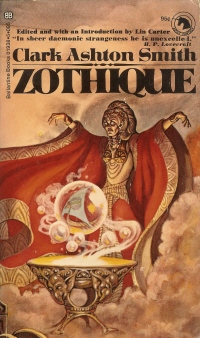
Zothique is a collection of fantasy short stories by Clark Ashton Smith, edited by Lin Carter. It was first published in paperback by Ballantine Books as the sixteenth volume of its Ballantine Adult Fantasy series in June 1970. It was the first themed collection of Smith's works assembled by Carter for the series. The stories were originally published in various fantasy magazines in the 1930s, notably Weird Tales.

"The Mathematics of Magic" is a fantasy novella by American writers L. Sprague de Camp and Fletcher Pratt, the second story in their Harold Shea series. It was first published in the August 1940 issue of the fantasy pulp magazine Unknown. It first appeared in book form, together with the preceding novella, "The Roaring Trumpet", in the collection The Incomplete Enchanter, issued in hardcover by Henry Holt and Company in 1941, and in paperback by Pyramid Books in 1960. It has since been reprinted in various collections by numerous other publishers, including The Compleat Enchanter (1975), The Incompleat Enchanter (1979), The Complete Compleat Enchanter (1989), and The Mathematics of Magic: The Enchanter Stories of L. Sprague de Camp and Fletcher Pratt (2007). It has been translated into Dutch and Italian. In 2016, the story was shortlisted for the Retro Hugo Award for Best Novella.

The Incomplete Enchanter is a collection of two fantasy novellas by American writers L. Sprague de Camp and Fletcher Pratt, the first volume in their Harold Shea series. The pieces were originally published in the magazine Unknown in the issues for May and August 1940. The collection was first published in hardcover by Henry Holt and Company in 1941 and in paperback by Pyramid Books in 1960.

"Divide and Rule" is a science fiction novella by American writer L. Sprague de Camp. It was first published as a serial in the magazine Unknown from April to May, 1939 and first appeared in book form in de Camp's collection Divide and Rule. The story was revised for book publication. The first stand-alone book edition of the story was published as a large-print hardcover by Thorndike Press in September 2003. An E-book edition of the story was issued by Gollancz's SF Gateway imprint on September 29, 2011 as part of a general release of de Camp's works in electronic form.

The Wall of Serpents is a fantasy novella by American science fiction and fantasy authors L. Sprague de Camp and Fletcher Pratt. The fourth story in their Harold Shea series, it was first published in the June 1953 issue of the fantasy pulp magazine Fantasy Fiction. It first appeared in book form, together with its sequel, "The Green Magician", in the collection Wall of Serpents, issued in hardcover by Avalon Books in 1960; the book has been reissued by a number of other publishers since. It has also been reprinted in various anthologies and collections, including Great Short Novels of Adult Fantasy I (1972), The Complete Compleat Enchanter (1989), and The Mathematics of Magic: The Enchanter Stories of L. Sprague de Camp and Fletcher Pratt (2007). It has been translated into Italian and German.



















